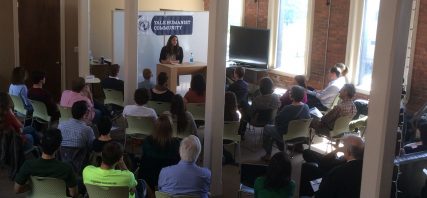Just before midnight on December 31, 2014, I raised a glass.
“I know this is cheesy,” I said, “But, if you’re willing, could we go around and name something we’re grateful to leave in 2014 and something we’re looking forward to in 2015?”
After some teasing, my friends consented and we went ahead with it. I was moved and inspired by what they shared—and I thought about just how much changed for me in 2014. I moved, adopted a wonderful rescue dog, got better about calling my family, became a vegetarian, wrote a lot, and quit some bad habits.
But perhaps the biggest change I experienced last year was leaving my job as a Humanist chaplain at Harvard. In 2010, when I packed my belongings into the back of a car and left the Midwest—making my way to Boston, where I couch-surfed and scraped by while starting as a very part-time staff member for a very small Humanist Chaplaincy—I never expected that I would leave a few years later to start a similar program at another university.
Launching Yale Humanist Community has been an amazing experience so far, but it’s also been more work than I imagined. Due to the unexpectedly immediate interest people have shown, we now host programs and events just about every day of the week—and my office is regularly full with students and community members looking to discuss what matters to them and why.
Programs aside, it’s also a lot of work to create and direct an organization. (Especially the fundraising part—like other similar programs, we don’t receive financial support from the university.) Building and directing a startup nonprofit has been a new kind of challenge, and I’m learning a lot. But I love every minute of it. Working with the passionate students and community members that make up Yale Humanist Community is not only immensely rewarding—it has become my top priority.
So here we are at the point of this piece; at my first major change of 2015. I’ve really enjoyed publishing this column more than once a week since 2013, but my situation has changed significantly since I launched it. So as of today, I will be stepping back from this column.
I will remain at RNS as a Contributing Editor, and I will continue to write on occasion—sometimes for RNS, sometimes for other outlets, and hopefully I’ll also find time for a larger writing project I’ve been thinking about. But writing several pieces a week for this column isn’t feasible at the moment; right now my primary focus needs to be on the work of building community.
I want to express my sincere gratitude to everyone who read this column, to the guest columnists and interviewees, and to the many people who’ve supported me since I joined RNS and in the years before. And, of course, a special thank you to my colleagues at RNS for your support. I look forward to continuing to work with and learn from you.
If you want to continue to follow my writing, the simplest way is to like my Facebook page and follow me on Twitter. If you want updates on my work with Yale Humanist Community, sign up for our monthly e-newsletter.
Some of my friends will probably tease me for this sincerity, but I want to end this column by rearticulating what I said when I started it: I continue to believe that atheism is so much more than not being religious. This is reflected in the slogan for Humanist Haven, Yale Humanist Community’s Sunday gathering: “There’s more to being nonreligious than what you don’t believe.” The more I do this work, the more I see just how rich Humanism can be when we focus on the things that we stand for.
When I started writing this column, I set out with the goal of lifting up frequently overlooked nontheist perspectives—the atheist voices that are generally ignored by those who are only interested in narratives of conflict and certainty. I will continue to do what I can to listen to and elevate different kinds of voices.
So, in the spirit of lifting up other voices, I’m going to end this column with someone else’s. Here’s one of my favorite quotes from one of my favorite RNS interviews—Dr. Monica Miller:
“If atheists want to really tackle such longstanding problems and challenges, then they’d start off well by adopting a brand of atheism or Humanism rooted in uncertainty—a celebration of difference not simply for what benefits and beauty it holds, but for its effects to unsettle. Learning to live uncertainly in an uncertain world is what Humanism, at its best, is all about.”
I’m not entirely sure what will come after this column, but here’s to continuing to live uncertainly in an uncertain world—and working together to understand and improve it.






